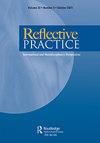Exploring Irish high-performance sports coaches’ understanding and application of reflective practice
IF 1.6
Q2 EDUCATION & EDUCATIONAL RESEARCH
引用次数: 0
Abstract
ABSTRACT The role and efficacy of reflective practice in sport continues to be critiqued, despite the increasing research evidence in its support. This study explored the understanding of Irish high-performance sport coaches in terms of a) purposes, b) processes, c) enablers and barriers, and d) knowledge sources of reflective practice. Semi-structured interview data were acquired from Irish male rugby union (n = 5) and hockey (n = 4) coaches for analysis. The participants’ reflective practice-based descriptions revealed findings related to the four inquiry criteria. First, reflective practice incorporated purposes such as problem solving and contribution towards various aspects of learning and development for the coach and their athletes. Second, reflective practice processes were cyclical and included questioning, self-questioning, and feedback. Third, the nature of high-performance sport involved several enablers (mentors and video-based technology) and barriers (time, results, and tactical and player demands). Fourth, the knowledge sources (i.e. pedagogical approaches) towards reflective practice may have limited certain participants’ ability to become critically reflective practitioners. The findings have educational implications for preparing coaches to deal with the challenges related to working in a highly demanding, results-dependent, and high-pressure sport environment.探究爱尔兰高水平运动教练员对反思性训练的理解与应用
摘要尽管越来越多的研究证据支持反思练习,但反思练习在体育运动中的作用和功效仍受到批评。本研究探讨了爱尔兰高性能体育教练在a)目的、b)过程、c)促成因素和障碍以及d)反思实践的知识来源方面的理解。从爱尔兰男子橄榄球联盟(n=5)和曲棍球(n=4)教练那里获得半结构化访谈数据进行分析。参与者基于实践的反思性描述揭示了与四个调查标准相关的调查结果。首先,反思性实践包含了解决问题以及为教练及其运动员的学习和发展的各个方面做出贡献等目的。其次,反思性实践过程是周期性的,包括提问、自我提问和反馈。第三,高性能运动的性质涉及几个促成因素(导师和基于视频的技术)和障碍(时间、结果、战术和球员需求)。第四,反思实践的知识来源(即教学方法)可能限制了某些参与者成为批判性反思实践者的能力。这一发现对教练应对在高要求、依赖结果和高压的运动环境中工作所带来的挑战具有教育意义。
本文章由计算机程序翻译,如有差异,请以英文原文为准。
求助全文
约1分钟内获得全文
求助全文

 求助内容:
求助内容: 应助结果提醒方式:
应助结果提醒方式:


